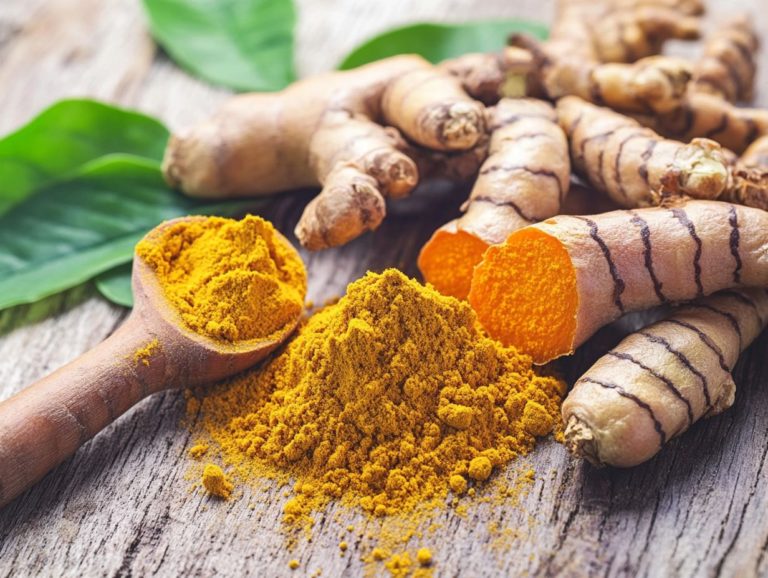Essential Tips for Choosing Natural Remedies
In a world that increasingly embraces nature as a source of health solutions, recognizing the significance of natural remedies, including herbal remedies, has never been more vital.
This article delves into the numerous advantages these alternatives offer, ranging from herbal supplements to essential oils and home remedies. When selecting remedies, it s important to consider key factors such as effectiveness, safety, and the quality of ingredients, along with potential risks.
You will find guidance on seeking reliable information and seamlessly incorporating these natural remedies into your health routine, ensuring a harmonious approach to wellness.
Contents
- Key Takeaways:
- The Importance of Natural Remedies
- Factors to Consider When Choosing Natural Remedies
- Types of Natural Remedies
- How to Find Reliable Information on Natural Remedies
- Integrating Natural Remedies into Your Health Routine
- Frequently Asked Questions
- What are natural remedies and why are they beneficial?
- What should I consider when choosing a natural remedy?
- Are natural remedies safe for everyone?
- How can I ensure the quality of a natural remedy?
- Do natural remedies have any potential side effects?
- Can I combine natural remedies with conventional medicine?
Key Takeaways:

- Choose natural remedies carefully – consider effectiveness, safety, quality of ingredients, and sources.
- Research and consult with a healthcare professional before integrating natural remedies into your health routine.
- Be cautious when combining natural remedies with conventional medicine. Always prioritize your health and safety.
The Importance of Natural Remedies
Natural remedies, especially those sourced from herbal products, have captured considerable attention in today s health conversations. They play a key role in enhancing overall well-being and addressing various health issues, from anxiety relief to combating the common cold. This makes them sought-after dietary supplements.
Discover the incredible power of herbal remedies as alternatives to conventional medicine! Herbal remedies such as St. John’s Wort, Kava, and Echinacea can serve as valuable dietary supplements that help strengthen your immune system (the body’s defense against illnesses). However, be aware of their potential side effects.
It s important to recognize that “natural” does not automatically mean “safe”, especially when integrating these herbal products into your health routine.
Understanding the Benefits of Natural Remedies
Natural remedies offer numerous benefits, particularly in managing health conditions like anxiety and the common cold. They serve as valuable alternatives to conventional treatments, especially when guided by safety tips from experts.
One standout feature of these remedies is their holistic approach (a method that considers the whole person, not just the symptoms). They address not just the symptoms, but also the underlying causes of anxiety, which is essential for true healing. For example, certain herbal supplements can encourage relaxation and enhance mental clarity, allowing for a return to balance in your life.
Many natural options, such as Ginseng and Ginger, support your immune system, boosting your body s resilience against infections. However, approach these remedies with a discerning eye. Be mindful of potential risks or interactions with other medications.
Consulting a healthcare provider can help ensure your safety and effectiveness. They may recommend resources like ConsumerLab.com or the American Cancer Society, making your journey toward wellness hopeful and secure.
Factors to Consider When Choosing Natural Remedies
When choosing natural remedies, it s crucial to weigh several important factors. Consider the safety of herbal supplements, the potential risks that may accompany their use, and the presence of certification labels from organizations like the FDA and NIH that assure quality and effectiveness.
Your health deserves nothing less than careful consideration.
Take the time to research and safely integrate natural remedies into your life!
Efficacy and Safety
Understanding the efficacy and safety of herbal remedies is essential for anyone considering their use. Not all natural remedies, including popular options like Ginkgo biloba, are safe or effective for everyone.
Many assume that herbal products are safe because they come from nature. This assumption can lead to unexpected health risks or adverse reactions.
Herbal medicine is complex, and thorough studies are necessary to determine the effectiveness of various remedies.
The interaction between herbal products and prescribed medications is a major concern. Always consult a healthcare provider before starting any herbal regimen.
Quality and Source of Ingredients

The quality and source of ingredients in herbal remedies greatly affect their effectiveness and safety. Choose products with certification labels from trusted authorities.
Herbal extracts can vary based on the plant s growing conditions and processing methods. For example, organic and sustainably sourced herbs often have higher concentrations of active compounds.
Without proper certification, some products may contain harmful contaminants or insufficient levels of active ingredients. Understand the importance of certification from organizations like Traditional Herbal Registration.
Certification labels, such as those from the USP or NSF, assure you that dietary supplements have undergone thorough testing for purity and potency. Trust the efficacy and safety of the herbal products you use.
Types of Natural Remedies
Natural remedies offer a diverse array of choices, from herbal supplements to essential oils and home remedies. Each option has unique benefits that enhance your health and wellness.
Herbal Supplements
Herbal supplements like St. John’s Wort, Kava, Echinacea, Ginseng, and Ginkgo biloba are popular for those seeking natural alternatives for health issues like anxiety.
St. John’s Wort is useful for symptoms of mild depression. Kava can help calm anxious moments.
Echinacea boosts the immune system, making it a favorite during cold and flu season. If you want increased energy, Ginseng is often recommended.
For cognitive function and memory enhancement, consider Ginkgo biloba. Be mindful of its interactions with other medications.
Remember, like any treatment, herbal supplements can have side effects. Consulting a healthcare provider can help ensure safety and efficacy in your health journey.
Essential Oils
Essential oils are powerful natural remedies that you can harness, often utilizing them in aromatherapy to promote relaxation and alleviate stress, providing yet another avenue for anxiety relief.
These aromatic compounds, extracted from a variety of plants, offer a wealth of benefits designed to enhance both your physical and emotional well-being. They can seamlessly fit into your daily routine, whether by diffusing them into the air, adding them to your bath for a soothing experience, or diluting them with carrier oils oils that help dilute essential oils for safe skin application for topical applications, ensuring safe usage and maximum benefits.
You ll find that each type of oil like lavender for its calming effects or eucalyptus for respiratory support boasts unique properties and potential advantages. Understanding their effectiveness is crucial, as some oils may cause skin irritation or allergic reactions in sensitive individuals. This reinforces the need for careful consideration of potential risks.
Home Remedies
Home remedies often leverage common ingredients and herbal solutions, like ginger and garlic, to effectively manage ailments like the common cold and enhance your immune system.
For example, sipping on ginger tea made from freshly grated ginger can provide soothing relief from a sore throat and invigorate your immune response. A warm concoction of honey and lemon serves as a delightful elixir for coughs and helps to clear nasal congestion, making it a popular choice among home remedies.
Garlic, celebrated for its antimicrobial properties, can easily find its way into your meals or be consumed raw to support your overall health. While these remedies hold promise, it s crucial to be mindful of any personal allergies or health conditions that may interact with herbal supplements.
Therefore, prioritizing a consultation with a healthcare provider especially if you have existing health conditions before embarking on any new treatment regimen is essential for ensuring both safety and optimal care.
How to Find Reliable Information on Natural Remedies

Finding reliable information on natural remedies is crucial for making well-informed decisions about their use. It demands thorough research into various types of herbal products and a solid understanding of the effectiveness of herbal medicine.
By diving into credible sources, such as studies from the NIH or American Cancer Society, you give yourself the power to navigate the complexities of natural remedies confidently.
Researching and Evaluating Sources
Researching and evaluating sources of information on herbal medicine is essential as it ensures the accuracy and reliability of the content you consume, especially when considering certification labels.
As you navigate this intricate field, it s beneficial to closely examine various credentials and endorsements. For example, checking if a product has received FDA approval can offer insight into its safety and effectiveness. Studies published by reputable institutions, such as the National Institutes of Health (NIH) or ConsumerLab.com, often provide valuable evidence that supports claims about specific herbal remedies.
Diving into research from the National Center for Complementary and Integrative Health (NCCIH) can further enrich your understanding. Ultimately, cross-referencing information from multiple trustworthy sources not only bolsters credibility but also gives you the power to make informed choices about your health.
Integrating Natural Remedies into Your Health Routine
Adding natural remedies to your health routine can boost your well-being in exciting ways! However, it’s vital to approach this wisely to maximize your health benefits.
Consulting a healthcare provider is essential to ensure that you understand how these remedies may interact with conventional medicine. Your health deserves careful consideration and informed choices.
Consulting with a Healthcare Professional
Consulting with a healthcare professional is a crucial step when you re considering natural remedies. This ensures that what you choose is both safe and effective, tailored to your unique health needs.
Such consultations are invaluable for uncovering any potential interactions with your current medications, protecting you from adverse reactions. They offer insights into the specific side effects associated with various herbal treatments, empowering you to make well-informed choices.
With the vast array of natural options at your fingertips, understanding which remedies best align with your specific health conditions can significantly enhance your overall well-being. This personalized approach not only optimizes the health benefits but also nurtures a deeper awareness of your health journey.
Combining Natural Remedies with Conventional Medicine
Integrating natural remedies with conventional medicine can create a more holistic healing environment that addresses both the physical and emotional dimensions of your health. However, it s wise to be vigilant, as some natural products might interact with your prescribed medications, either diminishing their effectiveness or introducing unexpected side effects.
To ensure a safe and beneficial combination, talking to your doctor is crucial. These experts can guide you through your options, offering insights into which remedies might enhance your treatment outcomes without compromising your safety. You can enhance your healing journey by harmonizing the advantages of both healing philosophies.
Frequently Asked Questions

What are natural remedies and why are they beneficial?
Natural remedies are alternative treatments that use natural ingredients, such as herbs, plants, and minerals, to promote health and well-being. They can be beneficial because they often have fewer side effects compared to conventional medicine and can address the root cause of a health issue.
What should I consider when choosing a natural remedy?
When choosing a natural remedy, it is important to consider your specific health concern, the quality and purity of the ingredients, and any potential interactions with medications or pre-existing conditions. To effectively incorporate these solutions, you may want to explore how to integrate natural remedies into daily life. It is also recommended to consult with a healthcare professional before starting any new treatment.
Are natural remedies safe for everyone?
While natural remedies are generally safe, they may not be suitable for everyone. Pregnant or breastfeeding women, children, and individuals with certain health conditions should exercise caution and consult with a healthcare professional before using natural remedies.
How can I ensure the quality of a natural remedy?
To ensure the quality of a natural remedy, look for products that have been tested and certified by a reputable organization, such as the United States Pharmacopeia (USP) or ConsumerLab.com. It is also important to research the company and read reviews from other customers.
Do natural remedies have any potential side effects?
While natural remedies are generally safe, they may still have potential side effects. These can vary depending on the individual and the type of remedy. It is important to carefully read and follow the recommended dosage and stop using the remedy if you experience any adverse reactions.
Can I combine natural remedies with conventional medicine?
In some cases, combining natural remedies with conventional medicine may be beneficial, but it is important to consult with a healthcare professional first. They can provide guidance on potential interactions and help create a safe and effective treatment plan.






